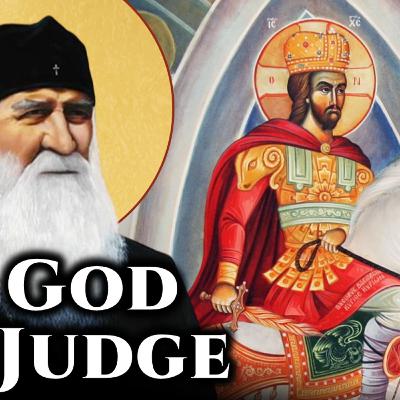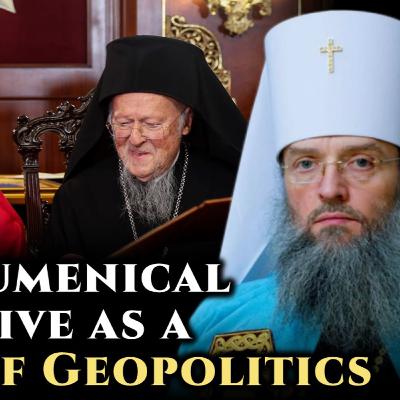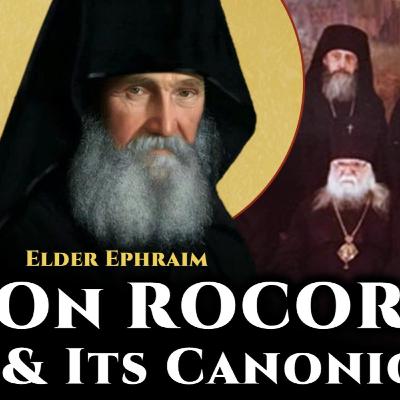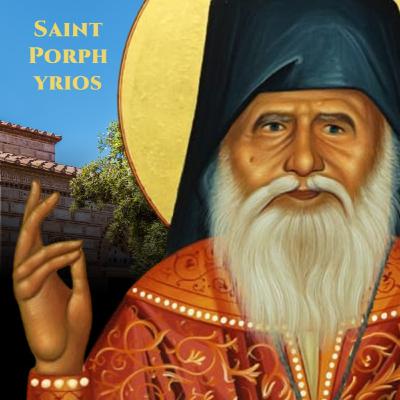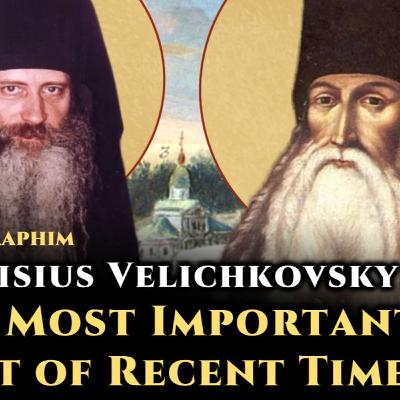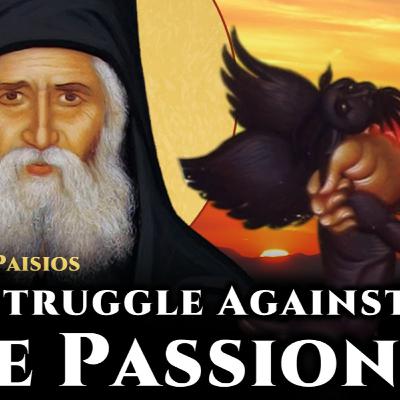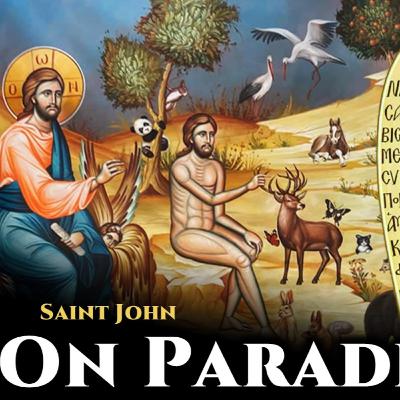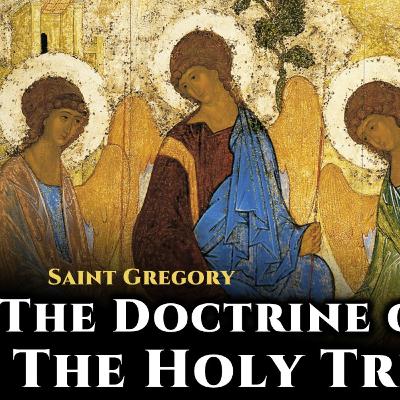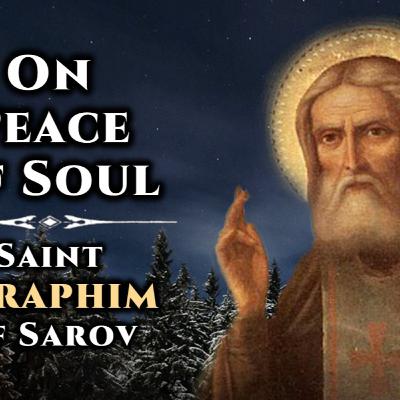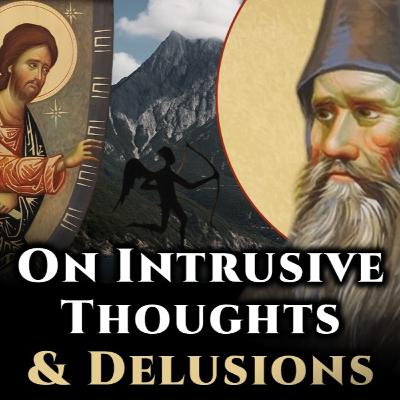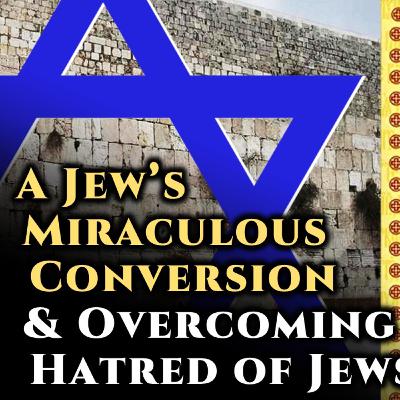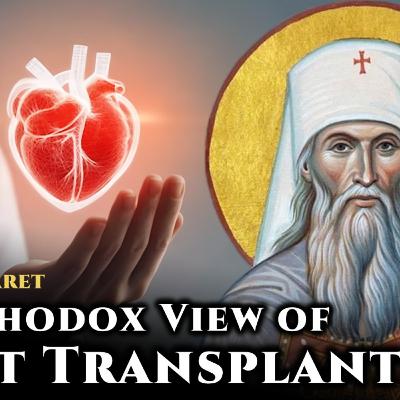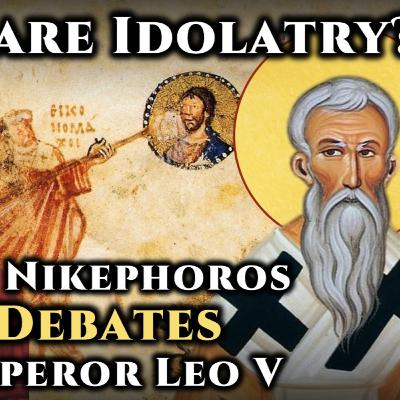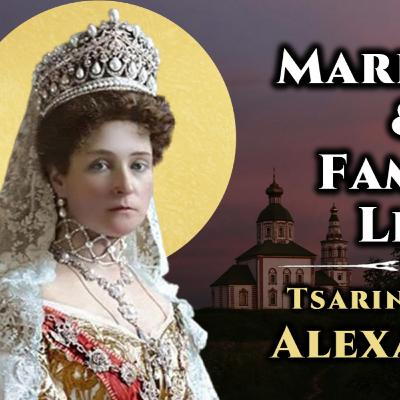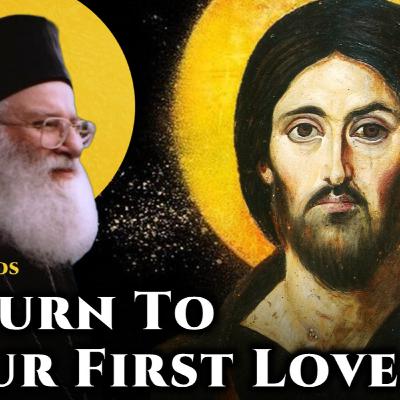Discover Orthodox Wisdom
Orthodox Wisdom

Orthodox Wisdom
Author: Readings from Saints of Holy Orthodoxy
Subscribed: 163Played: 6,226Subscribe
Share
© Readings from Saints of Holy Orthodoxy
Description
Readings of the Writings and Lives of Orthodox Christian Saints.
These recordings are free to download and share. All I ask is that you do so respectfully and reference this channel.
You can also contact me, Timothy Honeycutt, at: orthodoxwisdom1@gmail.com
Glory to Jesus Christ!
These recordings are free to download and share. All I ask is that you do so respectfully and reference this channel.
You can also contact me, Timothy Honeycutt, at: orthodoxwisdom1@gmail.com
Glory to Jesus Christ!
292 Episodes
Reverse
St. Justin Popovic (+1979) the great Serbian theologian of the 20th century, explains the nature and veracity of God being Judge of all creation. "It is natural for the heavenly Sower," writes St. Justin, "who has abundantly sown the seed of eternal, divine truths in the earth of the human soul, to come and see how much of that seed has rotted in the mire of lust, been strangled by the thorns of passion or withered by the coals of sinfulness, and how much has grown and yielded divine fruit, and, also, to reap and winnow the ripe ears of corn."A reading from The Orthodox Church and Ecumenism by St. Justin Popovic, p. 85-88.NOTE: The meaning of Theanthropic: divine (in Greek theos = God) and human (in Greek anthropos = man); the Theanthropos = the God-Man, i.e. Jesus Christ, the incarnate Son of God.📖 The Orthodox Church and Ecumenism by St. Justin Popovichttps://lazarica.co.uk/bookshop/📖 Orthodox Faith and Life in Christ by St. Justin Popovichttps://ibmgs.org/miscellaneous.html🎧 Introduction to the Lives of the Saints - St. Justin Popovićhttps://youtu.be/q1SQB8O2Aek🎧 Papism as the Oldest Protestantism - St. Justin Popovićhttps://youtu.be/6xXm1PfcQUw⛪ FIND an Orthodox parish and monastery near you: https://orthodox-world.org/https://orthodoxyinamerica.org/🎁Support my work here:https://buymeacoffee.com/orthodoxwisdom_______St. Justin teaches:It is natural for God, who is the Creator, Saviour and Sanctifier, also to be the Judge. As Creator, He brought us from non-being into being, ordaining that, as the goal of our existence, we become Godlike with the help of the soul He gave us in His likeness, and to increase with the increase of God... unto a perfect man, unto the measure of the stature of the fullness of Christ (Col. 2:19; Eph. 4:13). As Saviour, He saved us from sin, death and the devil by introducing into human nature, rendered mortal by sin, the principle and the power of resurrection and immortality. As Sanctifier, He has given us by grace, in His theanthropic Body, the Church, all the means and powers necessary for the adoption of His theanthropic ascesis of salvation and the fulfilment of the purpose of our existence. As Judge, He appraises, judges and determines our attitude towards Him as Creator and ourselves as His God-like creation, towards Him as Saviour and ourselves as the subject of salvation, towards Him as the Theanthropos, the Church, the Sanctifier, and ourselves as the object of sanctification, deification and likeness to the Theanthropos.God placed the yeast of desire for Christ into the dough of the human being, so that man, and with him all creation, should rise to Christ. For this reason all creation is essentially christocentric and is strongly drawn towards Christ as its natural and eternal Centre and Goal (cf. Rom. 8:19-23; Col. 1:16-17; Eph. 1:4-5). Whilst God, in His creative, saving and sanctifying role, appears as a tiller, sower and cultivator, He acts in His role as Judge as a reaper and winnower. It is natural for the heavenly Sower, who has abundantly sown the seed of eternal, divine truths in the earth of the human soul, to come and see how much of that seed has rotted in the mire of lust, been strangled by the thorns of passion or withered by the coals of sinfulness, and how much has grown and yielded divine fruit, and, also, to reap and winnow the ripe ears of corn.It would be unpardonably unjust, insulting and tyrannical if God were to act as Judge without having previously appeared as Saviour and Sanctifier. A God who would not reveal the way to eternal life and eternal truth or give men the means of salvation from sin, death and the devil, who would not be their Saviour, would have no right to judge mankind. Mankind would be right to say with one soul and one voice to such a tyrannical God what the wicked servant said in the Parable of the Talents (Matt. 25:24-25).
Met. Luke of the Ukrainian Orthodox Church (UOC) delivered this address on December 4, 2025 at the conference titled: "The Crucifixion of Orthodoxy in the 21st Century: Spiritual Wars, Ecumenical Offensive, and Global Politics" hosted by Center for Geostrategic Studies in Belgrade, Serbia.📖 The Ecumenical Offensive as a Tool of Geopolitics: Media, Finances, and Diplomacy of the Vatican and the Phanar by Met. Luke of Zaporizhzhia and Melitopolhttps://uoj.news/en/news/85834-uoc-bishop-calls-for-statement-on-boundaries-of-ecumenism🎧 On the Canons of the Ecumenical Councils - Fr. Seraphim Rosehttps://youtu.be/d3nDu6TlWLA🎧 Ecumenism is "Downright Scum, Spiritual Filth" - St. Porphyrios of Kafsokalyviahttps://youtu.be/QxFFmBHbFqM🎧 Ecumenism: One of the Most Dangerous Heresies - St. Sophrony the Athonitehttps://youtu.be/7A0_Vw--4LU🎧 Does the Russian Orthodox Church Need to Participate in the Ecumenical Movement? (Part I/II)https://youtu.be/FjCGKeBaMzw⛪ FIND an Orthodox parish and monastery near you: https://orthodox-world.org/https://orthodoxyinamerica.org/🎁Support my work here:https://buymeacoffee.com/orthodoxwisdom_______Met. Luke teaches:Modern geopolitical struggle extends far beyond economics and military security, actively invading the spiritual sphere. It influences the life of the Church, distorting the understanding of canonical order and the true state of affairs. In this context, ecumenical initiatives of the Vatican and the Ecumenical Patriarchate (Phanar) play a special role, rapidly transforming from platforms for inter-Christian dialogue into instruments of “soft power.” Through media channels, material support, and direct participation in diplomatic processes, these centers influence elite sympathies, legitimize new church (and quasi-church) structures, and alter the balance of power in entire regions, as vividly demonstrated by the example of Ukraine.Modern ecumenism, initiated by the Vatican and the Phanar, often goes beyond theological dialogue, turning into a means for forming geopolitical alliances, exerting pressure on local Orthodox churches, introducing liberal social agendas, and justifying the legitimacy of secular state interference in internal church processes. Thus, the form of “dialogue” is used as a diplomatic platform for advancing influence.The Vatican demonstrates significant experience in constructing interconfessional dialogue, humanitarian initiatives, and political diplomacy, creating for itself the image of a “peacemaker”. Ecumenical dialogue is used by it as a channel for forming special relations with influential states, influencing religious processes in Eastern Europe, and promoting Catholic social doctrine as a global norm.The risks and consequences of this activity for Orthodoxy include:-Doctrinal dilution and institutional subordination to the Vatican.-Polarization within the Orthodox world, as there is a threat of division into supporters of different centers.-Instrumentalization of religion by secular states through support for certain church actors.-Loss of trust among believers, who may begin to perceive the Church as a political project.-Escalation of inter-Orthodox conflicts using information campaigns and sanctions.6. Spiritual and Theological Measures-Increase in conciliar anathematizations and public condemnations of modern forms of ecumenism and “Eastern Papism” (following the example of the ROCOR decisions of 1983 on ecumenism).-Revival everywhere of the practice of public reading of the “Synodikon of Orthodoxy” on the Sunday of the Triumph of Orthodoxy, with additions for modern threats.-Periodic prayer services for the enlightenment of those who have fallen away (in the diocese entrusted to me, I commemorate “those who cause us afflictions” during the Great Entrance when transferring the Gifts).
For a very breif time in 1991, Elder Ephraim (+2019) was a member of the Russian Orthodox Church Outside Russia (ROCOR). Compelled to address his reasons for joining the Synod, Elder Ephraim composed this statement explaining the position of ROCOR and its canonicity. His statement is valuable to all Orthodox Christians in today's struggle against the heresy of Ecumenism and for the unity of the Orthodox Church.0:00 Introduction1:52 Elder Ephraim's StatementThe inclusion of the introduction by the editors of Orthodox Tradition (Old Calendarists from Etna, CA) is neither to promote nor demote them. At minimum, their words provide valuable context and are appropriate in setting up the audience for their english translation of Elder Ephraim's original greek. It's up to the listener to draw their own conclusions about the Old Calenderists and more importantly, the words of Elder Ephraim. 📖 Elder Ephraim on the Russian Orthodox Church Abroadhttp://orthodoxinfo.com/ecumenism/ephraim_roca.aspx🎧 PLAYLIST: Elder Ephraim of AZ & St. Joseph the Hesychast - Readingshttps://www.youtube.com/playlist?list=PLzFKi22k2KYg5pt1Tvc3lnjd41E9pdR-p🎧 The Church, Ecumenism, and the Salvation of the World - Elder Ephraim of Philotheou and Arizonahttps://youtu.be/Srl9lCkmCM4🎧 Pray the Jesus Prayer with Elder Ephraim:https://youtu.be/pmFA4LTADQE?si=ig5DyyyQgX-WEgOA🎧 On Trials and Temptations - Elder Ephraim of Arizonahttps://youtu.be/yX68hapAbjY⛪ FIND an Orthodox parish and monastery near you: https://orthodox-world.org/https://orthodoxyinamerica.org/🎁Support my work here:https://buymeacoffee.com/orthodoxwisdom_______Elder Ephraim writes:The Apostolic Succession of the Bishops of the Russian Orthodox Church Abroad cannot be impugned, since all of the present Bishops hold canonical Consecrations from the Bishops of the pre-Revolutionary era and their successors.Patriarch Tikhon, foreseeing a bleak future for the Russian Church, issued a decree to the Bishops outside Soviet Russia, granting them the right to organize self-governing synodal bodies. Despite this, the exiled Russian Hierarchs, having lived in an atmosphere of utmost loyalty to the law and obedience under the Tsar, insisted, during their first few years of exile, on maintaining contact with their base (Patriarch Tikhon and his successors) and to seek from there approval for their more momentous decisions at least—though this was difficult under their circumstances at the time (persecutions, banishments, etc.). This communion was abruptly cut off by the capitulation of the locum tenens and later Patriarch [Sergius] (Stragorodsky) in his infamous declaration—something totally unacceptable to the Bishops in exile—, assuring the full submission of the Church to the atheist regime and ordering the faithful to show full obedience to and pray for the Soviet authorities. In my opinion, this rupture in communion was justified by the Canons, which provide for the cessation of all commemoration of the first Hierarch of a local Church in the event that he preaches heretical teachings; for Marxism is not only a political system, but entails a secular worldview, indeed a heresy.
A spiritual son of St. Porphyrios describes how the elder served Christ with incredible love and devotion in the Divine Liturgy.A reading from “Father Porphyrios: The Discerning, The Foreseeing, The Healer” by Anargyros J. Kalliatsos, p. 52-54🎧 To Be A Christian You Must Become A Poet - St. Porphyrioshttps://youtu.be/sp_NV5zj9wo🎧 Noetic Sound Waves of the Heart - From the Life of St. Porphyrioshttps://youtu.be/n5dWVVDDvhM🎧 Original recording of Saint Porphyrios saying the Jesus Prayer:https://youtu.be/w7XSW7wpCfY?si=w3yUXGV94QMWg4FH📖 Wounded by Love: The Life and Wisdom of Elder Porphyrios:https://www.holycross.org/products/wounded-by-love-the-life-and-the-wisdom-of-elder-porphyrios?srsltid=AfmBOoorE21YcZGUDow6RQlSnMJLerM851JSD-JP01Rl_2lvrmd0tO7n📖Healing the Soul: Saint Porphyrios as a Model for Our Lives. The St. John Chrysostom Monastery in Wisconsin publishes this book. Email them to ask how to obtain a copy:https://www.stchrysostomoscrafts.com/⛪ FIND an Orthodox parish and monastery near you: https://orthodox-world.org/https://orthodoxyinamerica.org/🎁Support my work here:https://buymeacoffee.com/orthodoxwisdom_______Father Porphyrios was actually living the divine mystery. This was obvious by the way he acted. The consecrated bread was for him really the Body of Christ. And when he cut it, he felt pain in his heart. He was more than sure that he cut Christ's Body itself! During the Prothesis, he was reading the prayers with particular emphasis and such expression that even the most faithless could not fail being moved. It is impossible to forget the way he prayed for the living and the dead: "Remember, Lord, your servant So-and-so." It was asked with such sweetness and in such a supplicatory tone that it was impossible to be refused; not by God, who is merciful, forbearing, and full of love, but even by the worst criminal of the world. I also noticed that during the Divine Liturgy Papouli gave the impression that he was not hearing or seeing. He was not in touch with the world around him. He was living in his own world. Nevertheless, I did not leave him in peace even there. Every now and then, I went near him to show him my love. With full response he made the sign of the cross on my forehead with the sacred spoon' or his cross, or any other sacred object that he had in his saintly hands at that time. That was not done in the way the other priests did it. He crossed with such faith and force on the forehead, the head, or any other part of the body that it was really felt. Sometimes, I had the impression that my forehead started bleeding. Of course, that never happened. What also impressed me enormously was the way he collected the Divine Pearls! His diligence, his devotion, his care, and his fear in case he lost one of them could not be described. He was literally sweating from agony. Finally, I would consider it an omission if I did not say anything, at least two words, about the way father Porphyrios chanted. His chanting bore no relation to the common chanting we hear in most churches today. It had something completely distinct. It was plain, unaffected, low, without high pitches and other vocal techniques reminding oriental songs. He avoided showing off his vocal ability. This does not mean that he lacked such an ability. What he was interested in was to pronounce correctly and clearly what he chanted; on the one hand, to offer the chant to the people comprehensibly and, on the other hand, to have a direct and continuous contact with God. He achieved both because he had great faith in God and he loved Him more than anything else in the world.
Written in 1972, Fr. Seraphim Rose draws attention to the significance of St. Paisius Velichkovsky (+1794) for us today, stating, "...for Orthodox Christians of the 20th century there is no more important Holy Father of recent times than Blessed Paisius Velichkovsky."A reading of Fr. Seraphim Rose's Introduction to: "Blessed Paisius Velichkovsky: The Man Behind the Philokalia" by Schema-monk Metrophanes📖 Read the Introduction here:https://jordanville.org/news_121129_2http://orthodoxinfo.com/phronema/intro_bpv.aspx📖 Currently available books by Fr. Seraphim:https://www.sainthermanmonastery.com/Fr-Seraphim-s/1817.htm🎧 On Prelest (Spiritual Deception) - Fr. Seraphim Rosehttps://youtu.be/Pt00jwZ37ik🎧 The Holy Fathers of Orthodox Spirituality, Pt. I - Fr. Seraphim Rosehttps://youtu.be/ZEDGphNMUw0🎥 Experiences with Fr. Seraphim Rose - from Archpriest Paul Babahttps://youtu.be/w2Ej6Z8e90w🎧 See my playlist of readings of Fr. Seraphim Rose:https://www.youtube.com/playlist?list=PLzFKi22k2KYjDHTp3rJVE7B66juR7bDzI⛪ FIND an Orthodox parish and monastery near you: https://orthodox-world.org/https://orthodoxyinamerica.org/🎁Support my work here:https://buymeacoffee.com/orthodoxwisdom_______Fr. Seraphim writes:"...for Orthodox Christians of the 20th century there is no more important Holy Father of recent times than Blessed Paisius Velichkovsky. This is so not merely because of his holy life; not merely because, like another Saint Gregory Palamas, he defended the hesychast practice of the mental Prayer of Jesus; not only because he, through his many disciples, inspired the great monastic revival of the 19th century which flowered most notably in the holy Elders of Optina Monastery; but most of all because he redirected the attention of Orthodox Christians to the sources of Holy Orthodoxy, which are the only foundation of true Orthodox life and thought whether of the past or of the present, whether of monks or of laymen.It is these very same sources—the Divine Scriptures and the writings of the Holy Fathers—which are the foundation of all genuine Orthodoxy in our own times. The observer of the Orthodox world today can see easily enough what "Orthodoxy" becomes when these sources are not made the foundation of life and thought.The followers of unenlightened custom are themselves innocent; they merely accept what has been "handed down" to them. But not seeing the meaning and not knowing the sources of what has been handed down, they are easily led into error, accepting customs which the Church has allowed only out of her condescension or economy as if they were the best of Orthodoxy, and also improper customs of recent heterodox origin and inspiration, together with the pure and meaningful Orthodox customs handed down from the Holy Fathers. Under strict yet prudent pastors, such people can be guided in the true path of Orthodoxy; but in our own time of such widespread irresponsible Church leadership, these people are more often guided gradually into a path of ever greater and more senseless innovation and reform, the clearest example of which is perhaps the Greek Archdiocese of America, where pews, organs, and Uniat spirituality and theology have become the new "customs" of an unfortunate people whose Orthodoxy has been stolen from it.
St. Seraphim addresses two related spiritual diseases that plague many at various times, offering insight into how to overcome them and remain close to Christ.This reading comes from: Life and Teaching of St. Seraphim of Sarov📖 Life and Teaching of St. Seraphim of Sarovhttps://churchsupplies.jordanville.org/products/life-and-teaching-of-saint-seraphim-of-sarov?srsltid=AfmBOopmeXl6e0F3AWUW23i0Sy5XOCVLP002Q85QzKN09lymGZj5VLdv🎧 Despondency in Prayer - St. John of Kronstadthttps://youtu.be/dlH-e6gQQEM🎧 Drive Out Despair With The Jesus Prayer - St. Barsanuphius of Optinahttps://youtu.be/ELcvcmLMI7A🎧 The Acquisition of the Holy Spirit - St. Seraphim of Sarovhttps://youtu.be/i5rTls7uTsM🎧 Never Despair of Your Salvation (Concerning the Sin of Self-abuse)https://youtu.be/OOQxdpPd_PI🎧 On Peace of Soul - St. Seraphim of Sarovhttps://youtu.be/6LTSr5pu00A⛪ FIND an Orthodox parish and monastery near you: https://orthodox-world.org/https://orthodoxyinamerica.org/🎁Support my work here:https://buymeacoffee.com/orthodoxwisdom_______St. Seraphim teaches:An inseparable companion of the spirit of sorrow is boredom. It attacks a monk, as the Fathers have observed, at about midday, and it produces in him such a terrible restlessness that both the place where he lives and the brothers who live with him become unbearable to him; and during the reading there is aroused in him a kind of disgust, repeated yawning, and great hunger. Once the belly has been satisfied, the demon of boredom insinuates into the monk the idea of going out of his cell and talking to someone, suggesting that the only way of saving oneself from boredom is by constantly conversing with others. And the monk who is vanquished by boredom is like desert tumbleweed that now stops for a moment, and now is again at the mercy of the wind. He is like a wisp of cloud pursued by the wind.This affliction is cured by prayer, abstinence from idle talk, manual labor according to one's strength, reading of the Word of God, and patience; for it is born of faintheartedness, inactivity, and idle talk.When boredom vanquishes you, say to yourself, in accordance with the instructions of St. Isaac the Syrian: "You desire again an unclean and shameful life. And if the thought occurs to you: it is a great sin to kill oneself [with ascetic practices], — you should say in return:I am killing myself because I cannot live uncleanly. I shall die here so as not to see real death — the death of my soul in its relation to God. It is better for me to die here in purity than to live an evil life in the word. I have preferred such a death to my sins. I am killing myself because I have sinned against God, and I will no longer anger Him. What is life to me apart from God? This affliction I will bear, so as not to be deprived of the hope of heaven. Why should God care for my life, if I live evilly and anger Him? (Homily 22).Boredom is one thing, and the anguish of spirit that is called despondency is quite another. It sometimes happens that a man is in such a spiritual state that it seems to him that it would be easier to be annihilated or to be totally without consciousness or feeling than to remain any longer in this immeasurably painful state. One must come out of it quickly. Guard yourself against the spirit of despondency, for from it comes every kind of evil (St. Barsanuphius the Great, Answer 73)._______Orthodox Wisdom is dedicated to sharing the writings and lives of the Saints of the Orthodox Church. Glory to Jesus Christ!
St. Paisios provides guidance on fighting the sins and passions that plague us, and how to win the battle to receive a heavenly crown.A reading from Spiritual Counsels, Vol. V: Passions and Virtues by St. Paisios, p. 21-36📖 Spiritual Counsels, Vol. V: Passions and Virtues by St. Paisioshttps://www.holycross.org/products/passions-and-virtues-elder-paisios?srsltid=AfmBOoosr8olgBCwD0SYQ-GFS_bfXyRVYAsxDAiBGL9MlAUJ1SC3ssyE🎧 The Struggle Against Thoughts - St. Paisios the Athonitehttps://youtu.be/5sN-zHdnjto🎧 On Attention and Distraction - St. Ignatius Brianchaninovhttps://youtu.be/v5ZIEmv8RwQ🎧 Everyone Needs a Spiritual Father - St. Paisios the Athonitehttps://youtu.be/xaSeWRcJPHo🎧 Fighting the Passions - Archbishop Theophan of Poltavahttps://youtu.be/tNYLK80dFvA🎧 Holiness is in the Struggle! - Elder Athanasios Mitilinaioshttps://youtu.be/Qhm2ffdEBsc⛪ FIND an Orthodox parish and monastery near you: https://orthodox-world.org/https://orthodoxyinamerica.org/🎁Support my work here:https://buymeacoffee.com/orthodoxwisdom_______St. Paisios teaches:When there is no danger of becoming conceited and prideful, then God will certainly help. The Good God desires that we be delivered from our passions; but if we have pride or the predisposition to become prideful, then He does not help us to be delivered from our passions, for then we will imagine that we achieved it without His help.— Geronda, is it better to do away with a passion or a bad habit at once, or little by little? — If you can get rid of it immediately, it is best; otherwise it may leave some... residue. There is no need for delay. When one is crossing a river, particularly in the winter, he tries to do it as quickly as possible; otherwise, he'll freeze from the cold. If he crosses quickly, before being overcome by the cold, he will soon warm up again. You see, even tethered horses that want to get free will snap the rope with a sudden strong pull. Temptation requires a very sharp tug in order to sever the rope.— Geronda, does the remembrance of death help in this inner work? — Yes, it is very helpful. If we bear in mind the remembrance of death with hope in God, we will become aware of the vanity of this world and be helped spiritually. This is why we should keep the criterion (judgment) of God in mind and not forget that we will be judged for the sins we have committed and not repented for. "What am I doing? How can I live with so much negligence?" should be our thoughts. "If I should die right now, how will I be judged? Do I have a contract with death? Death comes both to the young and the old." If I could keep in mind that God may call me soon, then I would not be so inclined to sin.We sometimes try to acquire God's Grace and gifts through some magical means. We delude ourselves by thinking that we can acquire a virtue or even be sanctified without a struggle. However, for God to give, we must sow. How will God give if we do not work? What does the hymn say? "You have cultivated the barren desert?" God will provide abundant rain to soften the soil, but we must also "cultivate" our field. The earth is ready, but we must put our hand to the plough and sow our field; and whatever we sow, we will reap. But if we do not plough, how can we sow? And if we do not sow, what will we harvest? For this reason, we should not only ask what God can do for us, but what we can do for ourselves. The bank of Christ offers great interest rates. But if we make no deposit in His bank, how can we expect to make a withdrawal?_______Orthodox Wisdom is dedicated to sharing the writings and lives of the Saints of the Orthodox Church. Glory to Jesus Christ!
What was the nature of paradise? How should we understand the tree of life and the tree of the knowledge of good and evil? St. John of Damascus explains this and more.A reading from Chapter 2, Book 11 of the Exact Exposition of the Orthodox Faith 📖 Exact Exposition of the Orthodox Faith by St. John of Damascushttps://stanthonysmonastery.org/products/exact-exposition-of-the-orthodox-faith?srsltid=AfmBOooIh2HMkYAbPmSR-vRxp3-t7gnDMG-wE35u0kLCM3RfpbB0cVyi🎧 Against Those Who Attack the Divine Images (First Apology) - St. John of Damascushttps://youtu.be/bm2eV_anejw🎧 The Divine Bait - Sts. Gregory of Nyssa, Maximus the Confessor, & John of Damascushttps://youtu.be/8olZ4qkUrJE🎧 Adam's Lament - St. Silouan the Athonitehttps://youtu.be/n0e2bb0lTa0⛪ FIND an Orthodox parish and monastery near you: https://orthodox-world.org/https://orthodoxyinamerica.org/🎁Support my work here:https://buymeacoffee.com/orthodoxwisdom_______St. John teaches:Since God intended to fashion man after His own image and likeness from the visible and invisible creation to be a sort of king and ruler over the whole earth and the things in it, He prepared a sort of kingdom for him, in which he might dwell and lead a blessed and blissful life. And this divine Paradise prepared in Eden by the hands of God was a treasure house of every joy and pleasure. For "Eden" is interpreted as meaning "delight." It was situated in the east and was higher than all the rest of the earth. It was temperate in climate and bright with the softest and purest of air. It was luxuriant with ever-blooming plants, filled with fragrance, flooded with light, and surpassing all conception of sensible fairness and beauty. In truth, it was a divine place and a worthy habitation for God in His image. And in it no brute beasts dwelt, but only man, the handiwork of God.The tree of life was either a tree possessing a life-giving force or a tree that was to be eaten of only by such as were worthy of life and not subject to death. Some have imagined Paradise to have been material, while others have imagined it to have been spiritual. However, it seems to me that, just as man was created both physical and noetic, so did this most sacred domain of his have the twofold aspect of being perceptible both to the senses and to the nous. For, while in his body he dwelt in this most sacred and superbly beautiful place, as we have related, spiritually, that is, noetically he resided in a loftier and far more beautiful place. There he had the indwelling God as a dwelling place and wore Him as a glorious garment. He was wrapped about with His grace, and, like some one of the angels, he rejoiced in the enjoyment of that one sweetest fruit which is the theoria of God, and by this he was nourished. Now, this is indeed what is fittingly called the tree of life, for the sweetness of divine theoria communicates a life uninterrupted by death to them that partake of it. It is just this that God meant by "every tree" when He said: "Of every tree of Paradise thou shalt eat." For He is the all, in Whom and by Whom the universe endures._______Orthodox Wisdom is dedicated to sharing the writings and lives of the Saints of the Orthodox Church. Glory to Jesus Christ!
St. Gregory details the nature and characteristics of the Triune God: Father, Son, & Holy Spirit. A reading from Homily 8 (p. 55-58) from Saint Gregory Palamas: The Homilies📖 Saint Gregory Palamas: The Homilieshttps://mountthabor.com/products/saint-gregory-palamas-the-homilies🎧 The Nativity of our Lord Jesus Christ - Homily by St. Gregory Palamashttps://youtu.be/DHG2gakIqdQ🎧 The Filioque: From the Latins Which Were Obedient to Satan - St. Gregory Palamashttps://youtu.be/4FeQoutq16I🎧 Homily on the Eve of Theophany - St. Gregory Palamashttps://youtu.be/Z1whxp_kuV0🎧 The Hesychastic Life of the Young Mother of God - St. Gregory Palamashttps://youtu.be/uYsv8o0yyic⛪ FIND an Orthodox parish and monastery near you: https://orthodox-world.org/https://orthodoxyinamerica.org/🎁Support my work here:https://buymeacoffee.com/orthodoxwisdom_______St. Gregory teaches:Believing in God is different from believing God. To believe God is to regard His promises to us as sure and true, but to believe in Him is to have a right understanding of Him. Both are necessary for us and we must speak correctly in both respects, in such a way that people with correct understanding can be confident that we are faithful before the God to whom our faith is directed and that, being faithful, we shall be justified by Him.The Father is timeless, without beginning and pre-eternal. He is the sole cause and root of the divinity beheld in the Son and the Holy Spirit; not the sole Creator, but the sole Father of the only Son and the sole producer of the one Holy Spirit. He is for ever, He is the Father for ever, and He is the sole Father and the sole producer for ever. His one Son is co-eternal with Him. Like Him, the Son is without beginning in time, but inasmuch as He has the Father as begetter, root, source and origin, He is not without beginning. Before all ages He alone was begotten of Him without a body, without passion of change, and was not divided from Him. Being God from God, He is not one thing as God and another as Son. He is for ever, He is the Son for ever and He is with the Father for ever without confusion. He is the living Word, the true light, the enhypostatic Wisdom, cause and origin of all created things, for by Him all things were made.From the eternal Father who is without beginning the Holy Spirit also proceeds. As timeless He is together with the Father and the Son without beginning, but He is not without beginning, inasmuch as He has the Father as root, origin and cause, from whom He proceeded before all ages, without passion or change. He was not divided from the Father or the Son when He came from the Father and rested in the Son, for He was united with Them without confusion and indivisibly distinct. Being also God from God, He is not one thing as God and another as Comforter, inasmuch as He is the hypostatic existence of the Holy Spirit. He has His existence from the Father and is sent through the Son, as the firstfruits of eternal life and the earnest of the everlasting good things to come. He too is the cause of all created things, for in Him all things were made. He does not differ from the Father and the Son except that He is neither unbegotten nor begotten._______Orthodox Wisdom is dedicated to sharing the writings and lives of the Saints of the Orthodox Church. Glory to Jesus Christ!
St. Seraphim describes peace of soul in Christ and how to preserve this peace. As the saint says, "One must by every means strive to preserve peace of soul and not to be disturbed by offences from others..."This reading comes from: Life and Teaching of St. Seraphim of Sarov📖 Life and Teaching of St. Seraphim of Sarovhttps://churchsupplies.jordanville.org/products/life-and-teaching-of-saint-seraphim-of-sarov?srsltid=AfmBOopmeXl6e0F3AWUW23i0Sy5XOCVLP002Q85QzKN09lymGZj5VLdv🎧 The Acquisition of the Holy Spirit - St. Seraphim of Sarovhttps://youtu.be/i5rTls7uTsM🎧 On Refusal to Judge Our Neighbor - St. Dorotheos of Gazahttps://youtu.be/LiAZHn18uVI🎧 On God's Love For Us & The Grace of Humility - Elder Ephraim of Arizonahttps://youtu.be/SQblbVcDMts FIND an Orthodox parish and monastery near you: https://orthodox-world.org/https://orthodoxyinamerica.org/_______St. Seraphim teaches:Nothing is better than peace in Christ; in it is destroyed every warfare of the spirits of the air and earth: “For we wrestle not against flesh and blood, but against principalities, against powers, against the rulers of the darkness of this world, against spiritual wickedness in bigh places” (Eph. 6:12). It is the mark of a wise soul when a man plunges his mind within himself and has activity in his heart. Then the grace of God overshadows him, and he is in a peaceful state, and by means of this also in a most peaceful state: peaceful, that is, with a good conscience; and most peaceful, for the mind beholds within itself the grace of the Holy Spirit, according to the word of God:“And His place is in peace” (Ps. 75:3).And so we must concentrate all our thoughts, desires, and actions in order to receive the peace of God and to cry out ever with the Church: “O Lord our God, give us peace” (Isa. 26: 12).One must by every means strive to preserve peace of soul and not to be disturbed by offences from others; for this one must in every way strive to restrain anger and by means of attentiveness to keep the mind and heart from improper feelings. And therefore we must bear offences from others with equanimity and accustom ourselves to such a disposition of spirit that these offences seem to concern not us, but others. Such a practice can give quietness to the human heart and make it a dwelling for God Himself.For the preservation of peace of soul one must likewise by every means flee from judgement of others. By not judging and by silence peace of soul is maintained: when a man is in such a state, he receives Divine revelations. In order to free oneself from judging, one must take heed of oneself, not to accept outside thoughts from anyone and to be dead to everything. For the preservation of peace of soul one must more often enter into oneself and ask: where am I? At the same time one must watch that the bodily senses, especially sight, serve for the inner man and do not distract the soul by means of sensuous objects: for they only receive grace-bearing gifts who have interior activity and are vigilant over their souls._______Orthodox Wisdom is dedicated to sharing the writings and lives of the Saints of the Orthodox Church. Glory to Jesus Christ!
St. Silouan the Athonite writes on battling intrusive thoughts and recognizing delusions, emphasizing that we must "fight the enemy with the weapon of humility".A reading from "Saint Silouan the Athonite" by St. Sophrony the Athonite, p. 440-447📖 Saint Silouan the Athonite by St. Sophrony the Athonitehttps://www.holycross.org/products/saint-silouan-the-athonite📖 Spiritual Counsels, Vol. 3: Spiritual Struggle by St. Paisios the Athonitehttps://www.athoniteusa.com/products/saint-paisios-the-athonite-spiritual-counsels-volume-iii-spiritual-struggle?srsltid=AfmBOorzehHI_pB20A84pZFWkAJxcyimzUiiZ-lhw3E6bX3XloJV4VFo📖 Our Thoughts Determine Our Lives: The Life and Teachings of Elder Thaddeus of Vitovnicahttps://www.sainthermanmonastery.com/product-p/otdol.htm🎧 The Struggle Against Thoughts - St. Paisios the Athonitehttps://youtu.be/5sN-zHdnjto🎧 On Prelest (Spiritual Deception) - Fr. Seraphim Rosehttps://youtu.be/Pt00jwZ37ik🎧 Holiness is in the Struggle! - Elder Athanasios Mitilinaioshttps://youtu.be/Qhm2ffdEBsc🎧 On Attention and Distraction - St. Ignatius Brianchaninovhttps://youtu.be/v5ZIEmv8RwQ🎧 Noetic Sound Waves of the Heart - From the Life of St. Porphyrioshttps://youtu.be/n5dWVVDDvhM🎧 Everyone Needs a Spiritual Father - St. Paisios the Athonitehttps://youtu.be/xaSeWRcJPHo⛪ FIND an Orthodox parish and monastery near you: https://orthodox-world.org/https://orthodoxyinamerica.org/_______St. Silouan teaches:Beware these two thoughts, and fear them. The first suggests "You are a saint;' the other, 'You will not be saved.' Both come from the enemy, and there is no truth in them. Instead, think to yourself, 'I am a great sinner but the Lord is merciful. He loves man with a great love, and will forgive me my sins.' Believe in this way, and, you will see, the Lord will forgive you. But put no faith in feats of your own, however much you may have striven. An ascetic once said to me, 'I shall certainly be pardoned because I prostrate myself so many times a day;' but when death came, he rent his clothes.O how weak I am! I write a little and am already weary, and my body seeks rest. The Lord, too, when He was on earth in the flesh knew human weakness; and He, the Merciful One, grew weary on His way and slept in the boat during the storm; and when the disciples roused Him, He ordered the sea and the wind to be still, and there was a great calm. So, too, with us: great peace reigns in our souls when we call upon the holy name of the Lord. O Lord, grant us to praise Thee until our last breath!The Fathers of the Church say that the soul feels troubled and perplexed at visions proceeding from the enemy. But this applies only to the humble soul, who does not count herself worthy of visions, and feels either bewilderment or fear at the workings of the enemy; whereas the conceited man can experience neither fear nor even bewilderment, because he wants to have visions, and deems himself worthy of them, and so it is easy for the enemy to delude him. That which is of heaven is made known through the Holy Spirit, whereas earthly things are discovered by the mind — but the man who would discover God with his mind, through science and learning, is in a state of beguilement, for God is to be known only through the Holy Spirit. If in your mind you should think to see devils, humble yourself and try not to see them. Hasten to your confessor or the staretz to whom you have committed yourself. Tell him everything, and then the Lord will have mercy on you and you will escape delusion. But if you start thinking that you know more about the spiritual life than your spiritual father, and cease telling him in confession what befalls you, you will surely be beguiled for your pride. Fight the enemy with the weapon of humility.
Edifying excerpts from "The Way of a Pilgrim and The Pilgrim Continues His Way" concerning Jews and Orthodox Christianity. This reading is from the R.M. French translation of "The Way of a Pilgrim and The Pilgrim Continues His Way", p. 112-114, 139-140"Starets" means "Elder" in Russian🎧 Full audiobook:https://youtu.be/wh2Orojo1z0?si=LsyAccwIt7IzK94B⛪ FIND an Orthodox parish and monastery near you: https://orthodox-world.org/https://orthodoxyinamerica.org/_______From his very earliest years he was preparing to be a rabbi and studied hard at all the Jewish chitchat which was meant to disprove Christianity. One day he happened to be going through a Christian cemetery. He saw a human skull, which must have been taken out of some grave that had been recently disturbed. It had both its jaws, and there were some horrible-looking teeth in them. In a fit of temper he began to jeer at this skull; he spat at it, abused it, and spurned it with his foot. Not content with that, he picked it up and stuck it on a post-as they stick up the bones of animals to drive off greedy birds. After amusing himself in this way, he went home. The following night he had scarcely fallen asleep when suddenly an unknown man appeared to him and violently upbraided him, saying, "How dare you insult what is left of my poor bones? I am a Christian—but as for you, you are the enemy of Christ.”I listened to this story with reverence and humility, and I thought to myself, "How good and kind our Lord Jesus Christ is, and how great is His love! In what different ways He draws sinners to Himself. With what wisdom He uses things of little importance to lead on to great things. Who could have expected that the mischievous pranks of a Jew with some dead bones would bring him to the true knowledge of Jesus Christ and be the means of leading him to a devout life?"One day a pilgrim came to see us. He complained bitterly about the Jews and abused them. He had been going about their villages and had to put up with their unfriendliness and cheating. He was so bitter against them that he cursed them, even saying they were not fit to live because of their obstinacy and unbelief. Finally he said that he had such an aversion for them that it was quite beyond his control. "You have no right, friend," said the starets, "to abuse and curse the Jews like this. God made them just as He made us. You should be sorry for them and pray for them, not curse them. Believe me, the disgust you feel for them comes from the fact that you are not grounded in the love of God and have no interior prayer as a security and, therefore, no inward peace._______Orthodox Wisdom is dedicated to sharing the writings and lives of the Saints of the Orthodox Church. Glory to Jesus Christ!
Written in 1968, Met. Philaret examines the spiritual implications of the phenomenon of replacing a man's heart. It's worth noting that nothing here is said about replacement of other organs and therefore the listener should be wary to draw unnecessary conclusions from these words from Met. Philaret. Additionally, Met. Philaret does not address those who wish to be organ donors or who wish to save the life of another, such as their spouse or child. To my knowledge, this is only text addressing heart transplants from someone venerated as a saint. Please leave a comment below if you aware of other texts from saints and elders on heart and organ transplants.📖 An Orthodox View of Heart Transplantations by Met. Philaret of New Yorkhttp://orthodoxinfo.com/praxis/heart_trans.aspx🎧 Will the Heterodox Be Saved? - Met. Philaret of New Yorkhttps://youtu.be/wtI3PsNKpyY🎧 Who are the True Christian Patriots? - Met. Philaret of New Yorkhttps://youtu.be/dg208EJxByk🎧 The Life of Metropolitan Philaret of New Yorkhttps://youtu.be/4rR4jJ_23RY📖 Living According to God’s Will by Met. Philarethttps://churchsupplies.jordanville.org/products/living-according-to-god-s-will📖 Metropolitan Philaret of New York: Zealous Confessor for the Faithhttps://uncutmountainpress.com/products/metropolitan-philaret-of-new-york-zealous-confessor-for-the-faith⛪ FIND an Orthodox parish and monastery near you: https://orthodox-world.org/https://orthodoxyinamerica.org/_______Met. Philaret writes:The heart is the center, the mid-point of man's existence. And not only in the spiritual sense, where heart is the term for the center of one's spiritual person, one's "I"; in physical life, too, the physical heart is the chief organ and central point of the organism, being mysteriously and indissolubly connected with the experiences of one's soul. It is well known to all how a man's purely psychical and nervous experiences joy, anger, fright, etc.,—are reflected immediately in the action of the heart, and conversely how an unhealthy condition of the heart acts oppressively on the psyche and consciousness... Yes, here the bond is indissoluble—and if, instead of the continuation of a man's personal spiritual-bodily life, concentrated in his own heart, there is imposed on him a strange heart and some kind of strange life, until then totally unknown to him—then what is this if not a counterfeit of his departing life; what is this if not the annihilation of his spiritual-bodily life, his individuality, his personal "I"? And how and as whom will such a man present himself at the general resurrection?How far from this is the radiant Christian view of life and death I Imagine a deeply-believing Christian who has labored his whole life on the fulfillment of the Lord's commandments and on the purification of his own heart, and who finally draws near to that Christian end for which he has prayed and for which he has been preparing his whole life; if suddenly one were to say to him: "Don't you want to live a while longer? Here—we will cut out your heart and put in its place a different one, perhaps an ape's—and you will live for a while yet..." What would a believing Christian answer to this but the words of the Gospel—"Get thee behind me, Satan—thou savourest not the things that be of God, but these that be of men" (St. Matt. 16: 23)._______Orthodox Wisdom is dedicated to sharing the writings and lives of the Saints of the Orthodox Church. Glory to Jesus Christ!
Drawing upon St. John Chrysostom, Archbishop Averky examines this teaching from St. Paul and how modernists and ecumenists can and do twist it to their liking.📖 "There Must Be Heresies Among You" (1 Cor 11:19) (Orthodox Life, July-August, 1994)https://orthodoxlifemagazines.blogspot.com/🎧 Archbishop Averky: His Significance for the Ecumenical Orthodox Church - by Fr. Seraphim Rosehttps://youtu.be/04DCg8rZsDg🎧 What is Orthodoxy? - Archbishop Averky of Jordanvillehttps://youtu.be/cOIy6YaV5po🎧 I Have Not Come To Bring Peace, But A Sword - Archbishop Averky of Jordanvillehttps://youtu.be/e3FiL7CCN9M⛪ FIND an Orthodox parish and monastery near you: https://orthodox-world.org/https://orthodoxyinamerica.org/_______Achrbishop Averky writes:See how these people who so blatantly violate one of the most important rules of our Holy Church even dare to call themselves "Orthodox" and try, by way of all kinds of false interpretations of the Word of God, to justify their "dissension" with the age-old teaching of the Universal Church of Christ. And what is especially horrible - they take shelter behind their imaginary "Christian love" for the "dissenters." O how great is the evil of these contemporary evil-doers, how unlawfully do they misappropriate for themselves the patent on "Christian love," and all those who disagree with them they accuse of a lack of "Christian love," and even fanaticism! Saint John Chrysostom (Commentary on the first epistle to the Corinthians): "By the word 'heresies' he [Saint Paull understands here not errors concerning dogmas, but actual (and similar) quarrels. If he were speaking of errors concerning dogmas, however, he would not have given occasion for offense (with the words, for there must be). For Christ said, 'It must needs be that offences come' (Mat. 18:7), but at the same time He did not violate our free will and establish this as a necessity and inevitability for us. He foretold the future which happens from the evil will of mankind, not as a result of His prediction but from the arbritariness of depraved people. Offenses occurred not because He foretold them, but rather He foretold them because they were going to occur. For if offenses occurred out of necessity and not according to the will of those who caused them, then in vain would He have said, Woe to that man by whom the offence cometh. That the Apostle actually called these disturbances and divisions during meals heresies' we see clearly expressed by him in the previous sentence. For he said, I hear that there be divisions among you. He did not stop here however. Desiring to explain what divisions he is referring to, he then says, 'For in eating every one taketh before other his own supper' (11:21). It is evident that he is speaking of these disturbances; but do not be surprised that he calls them divisions (schisms). As I said, he desired to have a greater effect on them by using such an expression. If he had meant dogmatical heresies he would not have spoken to them so briefly."_______Orthodox Wisdom is dedicated to sharing the writings and lives of the Saints of the Orthodox Church. Glory to Jesus Christ!
St. Basil's mediation on the many virtues of bees and how Christians do well to imitate them. "Imitate the character of the bee," writes St. Basil, "because it constructs its honeycomb without injuring anyone or destroying another's fruit."An excerpt from homily eight of the Hexaemeron, a collection of nine homilies on the six days of creation. Note: in St. Basil’s time the queen bee was understood to be a king. They didn’t know the leader was a female until much later. I have kept the original text but when you hear “king” know that St. Basil is referring to the queen bee.📖 Hexaemeron by St. Basil the Greathttps://stanthonysmonastery.org/products/hexaemeron?srsltid=AfmBOopEzZqE0t0Z2M-lYo3Fmq7MeVjMJOG4eihWIa9zNc-wK5A5Pegl🎧 Scandalized? Be Like the Bee - St. Paisios the Athonitehttps://youtu.be/i9nRU9KnYIM🎧 A Lament for Sin - St. Basil the Greathttps://youtu.be/I6erTc_FPKI🎧 On Illness, Doctors, and Healing - St. Basil the Greathttps://youtu.be/WOxigGgPenw⛪ FIND an Orthodox parish and monastery near you: https://orthodox-world.org/https://orthodoxyinamerica.org/_______St. Basil teaches:Imitate the character of the bee, because it constructs its honeycomb without injuring anyone or destroying another's fruit. It gathers the wax openly from the flowers, then, sucking in with its mouth the honey, a dew like moisture sprinkled in the flowers, it injects this into the hollows of the wax. At first, therefore, it is liquid, then in time being matured, it attains its proper consistency and sweetness. The bee itself has won honorable and becoming praise from the Proverb, which calls it wise and industrious. It gathers its food so laboriously ("Whose labors," it is said, "kings and private men set before them for their health."), and devises so wisely its storehouses for the honey (stretching the wax into a thin membrane, it builds numerous cells adjacent to each other) that the great number of the connecting walls of the very tiny cells supports the whole. Each cell fastens upon the other, separated from, and at the same time joined to it by a thin partition. Then these compartments are built upon each other two and three stories. The bee avoids making one unbroken cavity lest the liquid, because of its weight, should break through and escape to the outside. Notice how the discoveries of geometry are merely incidental to the very wise bee. The cells of the honeycombs are all hexagonal and equilateral, not resting upon each other in a straight line, lest the supports, coinciding with the empty cells, might meet with disaster; but, the corners of the hexagons below form a base and support for those resting upon them so that they safely sustain the weights above them and hold the liquid separate in each cell.
The same arguments against icons today are found in this 9th century debate between the Patriarch of Constantinople and the Emperor. As St. Nikephoros said, "But the ‘Logos became flesh [Jn. 1:14].' He was a man seen by men, otherwise we could not reproduce in pictures what is unseen."Text is from the Life of St. Nikephoros of Constantinople found in the The Great Synaxaristes of the Orthodox Church (Lives of Saints)📖 Icons are Idolatry? A Discussion Between St. Nikephoros and the Emperor Leo V the Armenianhttps://www.nepsisblog.com/2025/06/icons-are-idolatry-discussion-between.html🎧 Against Those Who Attack the Divine Images (First Apology) - St. John of Damascushttps://youtu.be/bm2eV_anejw🎧 Never Will I Cease Honoring the Matter Which Wrought My Salvation! - St. John of Damascushttps://youtu.be/Dnp_CZasZgw⛪ FIND an Orthodox parish and monastery near you: https://orthodox-world.org/https://orthodoxyinamerica.org/_______The saint the explained that the Orthodox do not paint God, the transcendent reality, in images. For how can one paint what is not perceived by the eyes? When iconographers depict the Christian martyrs, the latter are not considered gods; but rather, they are deemed the faithful servants of God. Thus, we honor the martyrs for their valor, since they are like the attendants of the King. In our behalf do they represent our requests before Him. Nikephoros then attempted to make this clear to Leo in a manner in which he could understand. As emperor of so great a realm, did not have officials so that he might be among his subjects when absent? Thus, his subjects revere him through his officials. Certainly, Leo does not reproach his subjects for bringing their petitions before his officials. But Leo surely would not tolerate his functionaries to be addressed as emperor. Now Leo agreed with this example. How could he not?_______Orthodox Wisdom is dedicated to sharing the writings and lives of the Saints of the Orthodox Church. Glory to Jesus Christ!
Excerpts from her 1917 diary from the section on marriage, family, and children. The wife of Tsar St. Nicholas II, Tsarina St. Alexandra's simple and beautiful words come from her small diary bound in light blue fabric sewn by the Tsarina herself with a small cross embroidered in the corner. On the inside of the cover, written by the hand of Her Majesty, is a simple “Alix, 1917.”📖 Garden of the Heart: Spiritual Diary by Her Majesty the Empress Alexandra Fyodorovna Romanovahttps://www.amazon.com/Garden-Heart-Alexandra-Fyodorovna-Romanova/dp/1533411999🎧 PLAYLIST: Marriage and Family Life - Teachings from Orthodox Saintshttps://www.youtube.com/playlist?list=PLzFKi22k2KYgkVz_d0SAUQkWSGp-L75yd⛪ FIND an Orthodox parish and monastery near you: https://orthodox-world.org/https://orthodoxyinamerica.org/_______St. Alexandra writes:The meaning of marriage is to bring joy. It is meant to be that married life is the happiest, fullest, purest, and richest kind of life. This is God's establishment of perfection.Thus the divine intention is for marriage to bring happiness, to make the lives of both husband and wife fuller, for neither of them to lose but both of them to win. If a marriage does not bring happiness and does not make life richer and fuller, it is not the fault of matrimonial ties themselves; it is the fault of people bound with them.The wedding day should be always remembered and emphasized among the other important dates of life. This is the day, the light of which will illuminate till the end of life all other days. The joy of entering a marriage is not exultant but deep and calm.Selfless love is a duty in a family. Each should forget about their self and dedicate themselves to the other one. Each should blame themselves, not the other one, when something goes wrong. Endurance and patience are necessary, while impatience can ruin all. A sharp word can decelerate the merging of souls for months. From both sides, there should be a willingness to make the marriage happy and overcome anything standing in the way of this. The strongest love needs to be strengthened every day. The most unforgivable rude words are those said in your own house to those you love.It should be that the hands of a husband could do everything, inspired by love. It should be that every loving husband has a big heart. Many sufferers should find help in a real family. Every husband of a Christian wife should unite with her in her love to Christ. Because of this love to her, he will go through challenges of faith. By sharing her life full of faith and prayers, he too will tie his life with heaven.Between siblings there should be a strong and tender friendship. In our hearts and our lives, we should protect and nurture everything that is beautiful, true, and holy. Friendship bonds in our own house, in order for them to be deep, genuine, and cordial, should be shaped by parents by helping souls become closer. There is no purer, richer, or more fruitful friendship in the world than that in a family if such friendship's development is guided. A young man should be politer to his sister than to any other young lady in the world, and a young lady, before she has a husband, should consider her brother the closest person to her. In this world, they should protect one another from dangers and dishonest and disastrous paths._______Orthodox Wisdom is dedicated to sharing the writings and lives of the Saints of the Orthodox Church. Glory to Jesus Christ!
St. John Maximovitch appears in a vision and comforts a young man who was grieving the death of his mother. As the young man understood, "[St. John] affirms the Church’s prohibition of offering public prayers for the departed non-orthodox, but also affirms the teaching that private prayers for them are of great value and should be encouraged."📖 Read the text of this recording here:https://orthodoxheritage.org/2007%20Issues.pdf📖 Man of God: St. John of Shanghai and San Franciscohttps://hvcbookstore.com/St-John-of-SF/Man-of-God📖 The Orthodox Veneration of the Mother of God by St. John Maximovitchhttps://www.sainthermanmonastery.com/product-p/ven.htm🎧 How Should We Treat the Non-Orthodox? Fr. Seraphim Rose Respondshttps://youtu.be/6b8MgXrudPs🎧 Life After Death - St. John Maximovitchhttps://youtu.be/PdW_p4CmF2A⛪ FIND an Orthodox parish and monastery near you: https://orthodox-world.org/https://orthodoxyinamerica.org/_______I do not know the full meaning of what I experienced… One thing I noted is that Vladika said nothing and made no promises. I was simply assured of his prayers and of the need of my own and others’. I also note that he wore a monk’s mantle and staff. This would indicate to me that he did what he didin a private capacity rather than as a bishop in official capacity, which would mean that he affirms the Church’s prohibition of offering public prayers for the departed non-orthodox, but also affirms the teaching that private prayers for them are of great value and should be encouraged. _______Orthodox Wisdom is dedicated to sharing the writings and lives of the Saints of the Orthodox Church. Glory to Jesus Christ!
We all have times of apathy, boredom, and a general cooling off of our once fiery zeal. Elder Athanasios draws out valuable lessons from Christ’s words in Revelation to help us regain our zeal and our love for Christ.A reading from Lesson 10 (Rev. 2:4-7) on Revelation by Elder Athanasios MitilinaiosElder Athanasios Mitilinaios, a dynamic and beloved preacher, abbot of the Monastery of Komnineiou and Saint John the Theologian in Stomion, Larisa, Greece, gave 104 consecutive lessons of Revelation to thousands of faithful. This beloved elder, venerated by many in Greece and around the world, reposed in the Lord in the year 2006.The Lord said, "Nevertheless I have this against you, that you have left your first love. Remember therefore from where you have fallen; repent and do the first works, or else I will come to you quickly and remove your lampstand from its place—unless you repent." -Revelation 2:4-5📖 Revelation - The Seven Golden Lampstands (Vol. 1) by Elder Athanasios Mitilinaioshttps://www.zoepress.us/revelation-the-books📖 Remember Thy First Love by Archimandrite Zachariashttps://mountthabor.com/products/remember-thy-first-love?srsltid=AfmBOor4QP28IF3HO0I2K1FW-QzVErUTQWKoT5b7SwDmeIbiQ0T7xCy0🎧 The Cowardly Shall Suffer in the Lake of Fire (Rev. 21:8) - Elder Athanasios Mitilinaioshttps://youtu.be/jflIrMj3TXw🎧 Freemasonry: The Depths of Satan - Elder Athanasios Mitilinaioshttps://youtu.be/CUu-6a0KhHw🎧 Idolatry of Sexual Relations: Separation of the Purpose from Pleasure - Elder Athanasios Mitilinaioshttps://youtu.be/Bg54rv4r6Zs⛪ FIND an Orthodox parish and monastery near you: https://orthodox-world.org/https://orthodoxyinamerica.org/_______Elder Athanasios teaches:The bishop of Ephesus worked extensively to cleanse the Church of evildoers and especially of heretical teachers. Somehow, the anti-heretical struggle became the focus, the main preoccupation, of the church of Ephesus and in the process something was overlooked. What was overlooked was love for the Lord Jesus. I am very much afraid that this could be the case with a number of people in our audience who fight against evil and false faiths. They fail to develop their own spirituality. I have noticed this to be the reality among many of today's Christians. I am being very sincere in saying this. We need to become especially watchful and take up the necessary measures to correct this.Many times we notice this in people who are very active in the life of the parish. They lack this spiritual ascent and vice versa, those who have this spiritual sense do not have much involvement. They do not seek any involvement; they keep to themselves. The Lord reproves both. We will see in another epistle that He reproached the church that allowed People of a heretical influence to coexist with it. So, both of these are necessary—spiritual life and active involvement in the church. We must not gravitate towards one sector; we must work in all the areas of our spiritual life. We will work to defend our faith, but we will not ignore our own spiritual development. Just because I am active in the fight against the falsehood, I can't feel content that it is an indication that I am doing well spiritually.However, when some time passes, and we live many years in the faith, then this love may fade, and the result is a superficial form of worship. Our life enters the pattern of the daily routine. There is nothing worse than to reduce spiritual life to a routine and to keep going through the motions. Believe me, this routine is the death of the spiritual life.Now, if I can find something new in all this every day, then boredom in this daily routine will not become part of my life. Protect yourselves from this danger of the routine, because we can slip into the mode of superficial worship, and simply go through the motions. Woe to us if we left our first love, which is life itself, variety, interest, excitement—everything that the word life means.
A reading of the Life of St. Olga of Alaska, published by the Orthodox Church in America who glorified her as a saint in June 2025. St. Olga's life is very accessible to us who live in the world. She was a matushka and a mother of 13 children, always offering hospitality and whatever she could to those in need. Her quiet and sacrificial labors did not end when she reposed; many have found divine help when calling upon her for heavenly assistance. She is a great intercessor especially for midwives, pregnant women, couples hoping to conceive a child, abused women, and others suffering on earth. As St. Olga said in an appearance to a victim of sexual abuse, "God can create great beauty from complete desolation and nothingness."📖 The Life of St. Olga, published by the Orthodox Church in Americahttps://www.oca.org/saints/lives/2025/10/27/100561-righteous-mother-olga-of-kwethluktanqilria-arrsamquqwonderworker🎥 Uncovering of Saint Olga (Arrsamquq) of Alaska's holy relicshttps://youtu.be/2YwqgN0_VO0?si=W0c3aQS71jk2a3HN🎥 Glorification Liturgy of St. Olga in Kwethlukhttps://www.youtube.com/live/k0IJxQxOqyY?si=cM8wvwEroTMvB2j3📖 Akathist Hymn to St. Olga of Alaskahttps://arizonaorthodox.com/saints-north-america/matushka-olga-michael-kwethluk/akathist-matushka-olga-michael/🎧 Another version of her life, including a detailed miracle:https://youtu.be/2qSF1wCh95k⛪ FIND an Orthodox parish and monastery near you: https://orthodox-world.org/https://orthodoxyinamerica.org/_______Troparion:God has chosen a humble mother from Alaska to be an example for all the servants of God; he has given us Saint Olga as a helper in afflictions and as a guide to leading a life of sacrificial love. Therefore we entreat thee, O holy mother Olga: pray that we, thy sinful children, may be saved and rejoice with thee in the Kingdom of Heaven.Kontakion:Guided by the heavenly light and touched by Christ’s rich mercy, thy loving hands heal the wounds of those hurt in the past. Thy soft voice encourages all to remain faithful to God, for the eternal Lord will give the steadfast a crown of life. O holy mother Olga, visit us with love and reassure us, that we may accept whatever cross we must bear as chosen by the merciful God and that, through thy prayers, we do the will of God for the salvation of our souls._______Orthodox Wisdom is dedicated to sharing the writings and lives of the Saints of the Orthodox Church. Glory to Jesus Christ!


